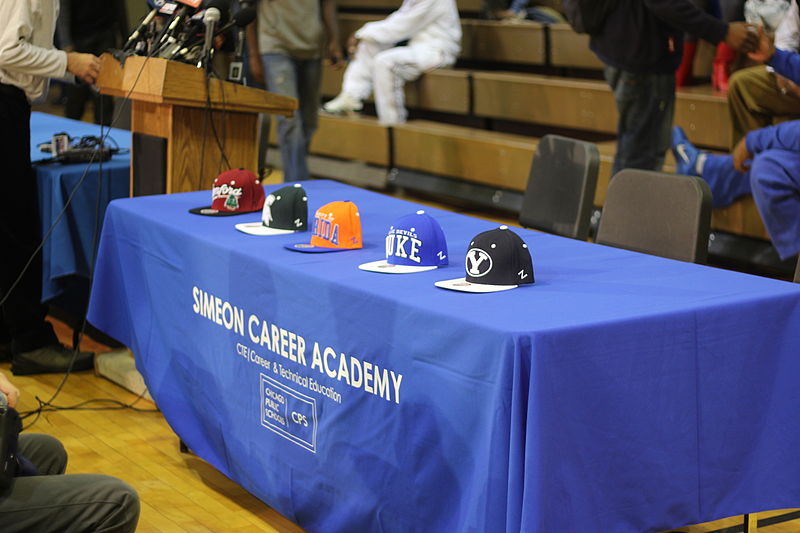By Torrance Latham
BU News Service
In 2010, veteran MC Bun B, and also one half of the iconic group UGK, released an album titled “Trill O.G.” The incredible LP delivered a controversial verse from rap star Drake, referencing the other half of UGK, the late Pimp C, on a song titled “Put It Down.” On the track, hip hop megastar Drake boasts about being a pimp, saying: “I got 100 girls in each phone/ Drizzy Drake mane, Young Sweet Jones.”
While a case can be made for Drake, or maybe even Sweet Jones, there has never been a pimp quite more notorious than the NCAA.
The current NCAA system has become a culture of acquisitive adults exploiting teenagers and monetizing the college experience for their own massive financial gain. It’s time to expunge these weak arguments for why they shouldn’t be paid, and challenge the NCAA to devise plan to make this happen.
College athletes need to be paid for their hard work, even though people will offer many excuses for why that shouldn’t happen. Some of the most highly educated figures within academia believe that a multi-billion dollar sports entertainment cartel should be able to get away with not paying its primary employees. Much like, you know, pimpin’.
The NCAA has the money to pay these players. CBS Sports and Turner Broadcasting bought the rights host the NCAA tournament in 2010 on their family of networks for nearly $11 billion, for the next 14 years. According to Nielson Fast Nationals, the 2015 NCAA tournament had the highest average viewership in 22 years. The 2015 Championship game became the most viewed title game in nearly 20 years, netting 28 million viewers. The head coaches of those teams — Mike Krzyzewski of Duke and Bo Ryan of Wisconsin-Madison — made a combined salary of $12,628,032.
Meanwhile, CBS and Turner sold $1.13 billion in advertisements during the 2015 tournament alone.
And according to business insider, the NCAA has made more money in advertisement revenue than the NFL playoffs. In 2014, the University of Alabama made over $150 million in athletic revenues — more than all 30 NHL teams and 25 of the 30 NBA teams.
Much like the college football playoffs in January, March is a month that the NCAA puts their finest work on full-display. The ACC is on pace to set a new conference record for NCAA tournament earnings in one postseason, guaranteed at least $39.9 million. Yet two teams, Syracuse and the University of North Carolina, make a mockery of the “students-first” mantra while advancing to this year’s Final Four. March Madness is one of the greatest events in American sports, but let’s be honest about what we’re watching here.
The NCAA will argue that student-athletes are not “employees” under federal law, but the typical Division I college football player devotes more than 40 hours per week to his sport, more than the average American work week. Meanwhile, the annual NCAA Division I football championship is played on a Monday night, causing most athletes to miss class. In 2014, the national football championship even required Florida State football players to miss the first day of spring classes. At other schools, the road to the NCAA men’s basketball championship may require student-athletes to miss up to a quarter of all class days during their spring semester.
Students and former students opposed to athletes being paid lament for their own student loan debt as a reason student-athletes should be grateful for their “free” education. It’s simple — your respective major pales in comparison to financial contribution to the university from a basketball star who draws tens of millions of dollars in advertising.
It’s interesting that the same NCAA administrators who stand adamantly against the idea of compensating a family for their child’s labor have no problem collecting their own massive salaries every year. If coaches, administrators and commentators are not interested in taking a vow of poverty, then athletes’ families should not have to do so either. The notion that an administrator or coach deserves to be fairly compensated while the individual doing the work does not is absurd.
There are methods of compensating student-athletes for their efforts that would resemble a more fair system. Schools could offer the athletes contracts like any other big business, and the players would be bound by those contracts. In order to remain eligible, each athlete would be required to remain in good standing as a full-time student in your institution. They’d have to qualify academically the same way in order to be able to play.
By that token, a two-year contract would simply pay less, which opens up the opportunity to leave or renegotiate after two years. Even if you’re weary of the secondary issues that come with treating athletes as university employees, allowing college athletes to receive money from avenues outside of the athletic department should be a reasonable compromise. And we would be one step closer to addressing the abhorrent hypocrisy present in college sports.
NCAA athletes deserve the same labor rights as the rest of us. There is no logical reason why athletes shouldn’t receive liberties that are freely given to those who aren’t doing the work to earn the money. Until we do something about the flagrant exploitation, the NCAA will continue to keep their pimp hand strong. In the words of rapper-turned-actor, Ice T, pimpin’ ain’t easy, but apparently the NCAA’s gotta do it.






